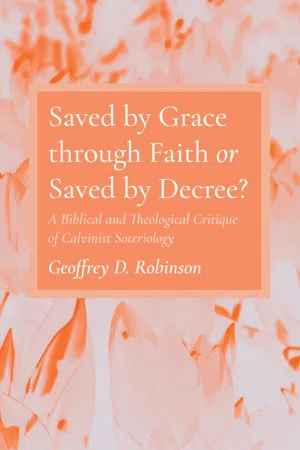![]()
1
A Brief History of the Doctrine of Salvation
The history outlined below focuses on those aspects of salvation denoted by TULIP. There are other aspects of salvation that will not be included such as justification, sanctification, and adoption into the family of God. While undoubtedly Christians differ on their understanding of these aspects of salvation also, the differences are not pivotal in the same way as TULIP.
The Early Church
The early church fathers tended to stress the role of human free will in decision-making in general, and in responding to the gospel call specifically. This emphasis was, at least in part, due to the prevailing philosophies and worldviews of the day that emphasized fatalism and absolute, impersonal determinism. “For Origen, as for all the early fathers, freedom was vital as the antithesis of fate or necessity.”
Of course, the early church’s theologians recognized the references to predestination in the Christian Scriptures, especially in Paul’s writings, and understood predestination to salvation to be based on God’s foreknowledge of how people would respond to the gospel call; those who responded favorably (by exercising faith and repenting of their sins) were predestined to salvation. Justin Martyr (d. AD 163) for example, held that “the people foreknown to believe in [Christ] were foreknown to pursue diligently the fear of the Lord.” However predestination was understood, there was the general conviction that it would not entail the overruling of human choice in the matter of salvation.
At this early stage of doctrinal development, the view that subsequently came to be known as synergism—the idea that God and man cooperate in the appropriation of God’s gift of salvation—was naturally dominant. Clement of Alexandria (150–215) is a good example:
This state of affairs was radically changed around 410 when Pelagius, a British monk and Christian moralist who was distressed by the lax moral conditions prevailing at Rome in his day, took offense at a prayer of Augustine, Bishop of Hippo, in which the latter stated: “Give what thou commandest and command what thou wilt.” He believed Augustine’s prayer would lead to a resignation to sin. If God’s grace was such that only God could give what God commanded then this raised the question as to the role of man’s responsibility for his behavior in moral affairs. For Pelagius moral responsibility implied moral ability. If Augustine was right, what room was there for human choices and moral responsibility?
Pelagius opposed the sentiment that a given moral responsibility is “too hard and difficult. We cannot do it. We are only human and hindered by the weakness of the flesh.” Such an outlook, argued Pelagius, implied God was unaware of the weaknesses of men in giving commands that men could not consistently fulfill. Also, God was not so unjust as to condemn a man for what he could not help.
With respect to the question of human freedom, Pelagius argued that three elements exist: (1) the possibility to make moral decisions (posse in Latin), (2) the will to make moral decisions (velle), and (3) the capacity to effect or realize the moral decision (esse). The first (the possibility) may be ascribed to God and associated with man’s creation by God, the other two elements (will and capacity) he attributed to the human agent. Consequently,
In addition to ascribing to man significant capacity to do the moral good, Pelagius also denied the view concerning the origin of man’s sinfulness, namely original sin. “Everything good and everything evil in respect of which we are either worthy of praise or of blame, is done by us, not born with us.”
Finally, for our purposes here, Pelagius and his disciple Coelestius also taught the following: (1) that a person can be without sin if he chooses, and (2) that unbaptized infants have eternal life. (3) God’s grace is manifested (a) in providing a revelation of his will in the Bible and in (b) forgiving those who repent of their sin. (4) Predestination to salvation was based upon God’s foreknowledge (prescience) of those who would respond favorably to God’s grace of forgiveness and thereby be saved.
Through his writings and his interactions with Augustine, Pelagius raised key issues concerning the doctrine of salvation that reverberated down the centuries to this day. The origin and extent of sin, the origin of the soul, the relationship between grace and human moral freedom, the extent of a person’s ability to do moral good, the nature of grace itself, the basis and nature of God’s predestination, and ultimately the nature of divine sovereignty. Most fundamentally, is salvati...
